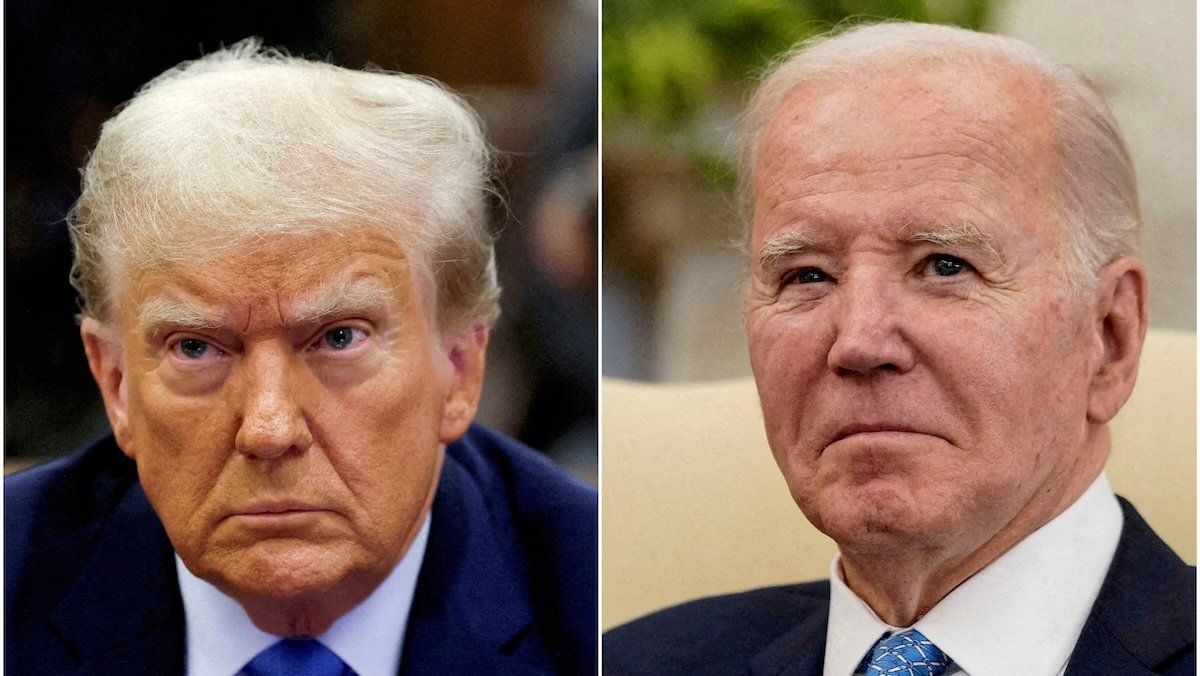Well, if they want a geriatric cockfight then we, as a nation, shall have one.
After months of circling each other, Joe Biden and Donald Trump abruptly agreed this week to face off in not one, but two televised presidential debates. The first will be in late June, the second in mid-September.
Trump had been taunting low-profile Joe for weeks, holding rallies with an empty podium at his side, accusing the gaffe-prone commander in chief of ducking him.
But Biden suddenly flipped the script, coming out swinging on social media with the Dirty Harry dare (“make my day, pal”) and a “sick burn” about hearing Trump was “available on Wednesdays” — the one weekday when the former president’s hush money criminal trial isn’t in session.
It’s a lot of “come at me, bro” energy from two guys who are each almost as old as Mike Tyson and Jake Paul combined.
But this is 2024, and just about every political exchange is designed for audiences to yell “ohhhhh sh$&!” from the cheap seats. There will, of course, not be audiences at these debates. Biden, knowing that Trump thrives uniquely in a crowd, managed to corner his rival into accepting a debate without them.
Why — WHY — are they even doing this? Biden, down in the polls again, wants a fresh chance to draw a contrast between himself as a self-styled safe — if only occasionally unsteady — pair of hands to defend democracy against the 91-time-indicted, election-denying, abortion-threatening chaos agent at the other podium.
Trump, meanwhile, is looking to roast a very vulnerable Joe over immigration, inflation, and Israel. But even more than that, he’s hoping that either he himself, or the lights and cameras around him, can elicit a signature, campaign-defining Biden-really-is-too-old-for-this type of gaffe from the president. To be fair, it’s not a bad gamble if you’re Trump and you’ve got a free Wednesday to prepare.
Do either of these guys hope to change a large number of minds? Probably not. But with the election likely to come down to a few million voters in a handful of swing states, each sees it as a gig worth taking.
But what about us? Do we really want this debate? Do we need it?
On the one hand, no, absolutely not. We aren’t likely to learn much about either of these men that we don’t already know. This isn’t, say, 2020 when, at the very least, there was some intrigue about seeing them face off directly for the first time against the backdrop of a worldwide pandemic and nationwide protests.
But by now we know who these guys are. We’ve seen enough of each of them. As candidates. As presidents. As the aging, raging, defining poles of political possibility in America today.
In a country where 70% of voters say they wish we had new faces atop the tickets, these debates will simply remind us even more acutely of what we dislike about one candidate or the other.
You’re better off watching grass grow.
But before you go looking for a good lawn, here’s one reason why watching this awful Statler and Waldorf remix might actually be worth it — not only for you, but for America more generally: It will bring us together.
That may sound strange. What about a political cagematch between rivals who despise each other could possibly be unifying?
Well, at a time when Americans are hyperpolarized and deeply worried that the media will be biased, hoodwinked by misinformation, or out of touch with their concerns, a live debate like this will be the only time that we are all in the same room, together, with the two candidates. It will be the only chance we get to see and hear them, unmediated, unspun, at length, and in direct contrast to each other.
This is particularly true of the candidate from the “other side” (whoever that is for you). Be honest, you probably know his views almost exclusively as a patchwork of quips and clips curated by an algorithm that caters to your biases.
To get beyond that, even in some small measure, it’s worth tuning into the smackdown as it’s happening.
- Biden and Trump's Middle East policies are "almost identical" - Harvard's Stephen Walt ›
- Biden vs Trump foreign policy: Political scientist Stephen Walt weighs in ›
- Biden vs. Trump redux: what we know so far ›
- Biden and Trump both betting debates will make the other look bad - GZERO Media ›
- Trump's VP pick: The short list - GZERO Media ›
- US presidential debate: More risk for Biden than Trump - GZERO Media ›
- Debate Bingo: Welcome to the 2024 Biden-Trump showdown - GZERO Media ›
